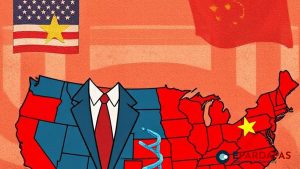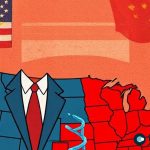
U.S. States Step Up to Shield Americans’ DNA From Foreign Exploitation, Especially China
As advancements in biotechnology accelerate, so do concerns about the potential misuse of Americans’ genetic information—particularly by foreign adversaries such as China. Amid stalled efforts in Congress, a growing number of U.S. states are stepping up with legislation designed to protect genetic data and counter national security threats.
China has reportedly spent years collecting genetic data from Americans, raising alarms in the national security community. With modern biotech tools like CRISPR and advanced AI, experts warn that this data could be weaponized. Rep. Jason Crow (D-Colo.), a member of the House Intelligence Committee, has warned publicly that DNA could be used to create targeted bioweapons—lethal tools that can incapacitate or kill specific individuals based on their unique genetic makeup.
“You can actually take someone’s DNA, take their medical profile, and you can target a biological weapon that will kill that person or take them off the battlefield,” Crow stated at the 2022 Aspen Security Forum.
The Fallout From Data Breaches and Corporate Collapse
The risks extend beyond government-level surveillance. Millions of Americans have voluntarily shared their DNA with consumer testing services like 23andMe. In 2023, a massive data breach exposed the genetic profiles of roughly 7 million users. By March 2024, 23andMe filed for Chapter 11 bankruptcy, sparking fresh concerns about the security and future handling of consumer DNA data.
Cybersecurity expert Adrianus Warmenhoven called it “a stark wake-up call for data privacy,” emphasizing that genetic information is far more sensitive than typical personal data—it’s a complete biological blueprint. The fear is that, during bankruptcy proceedings, genetic data could be considered an asset to be sold.
State Legislation Filling the Federal Gap
Despite bipartisan concern, Congress has yet to pass a comprehensive law preventing foreign adversaries from accessing U.S. genomic data. In the meantime, state legislatures have moved swiftly.
As of November 2024, 13 states—including California, Texas, Florida, and Virginia—have enacted laws regulating direct-to-consumer DNA testing, ensuring users have the right to protect and delete their genetic data. In early 2025, at least 11 more states introduced bills aimed at restricting the use of Chinese-made sequencing equipment, banning overseas data storage, and prohibiting cooperation with companies linked to foreign adversaries.
While Utah’s bill failed to pass, Tennessee successfully enacted its measure. In Montana, state Sen. Daniel Zolnikov is leading efforts through the Genomic Security Act, which builds on a 2023 privacy law that already bans sharing DNA without consent and gives residents the right to demand the destruction of their genetic data.
“We can’t wait for Congress,” Zolnikov said. “Their technology laws are decades outdated. If they’re just going to give speeches, we’ll do the legislating.”
The new Montana bill goes even further, explicitly prohibiting medical and research facilities from using equipment or software developed by companies associated with foreign adversaries, particularly China. It also provides funding for institutions to replace foreign-made tools and bars DNA data from being stored outside the U.S. without user consent.
Violations can lead to $10,000 in fines per offense, while individuals can sue for no less than $5,000 in damages per unauthorized use.
Beijing’s Biotech Ambitions and Military Fusion
China’s ambitions in biotechnology are no secret. Beijing has invested billions into genetic research, aiming to dominate the global bioeconomy. The country’s military-civil fusion doctrine mandates that private companies must share their data and technologies with the state—blurring the lines between civilian research and military applications.
“Chinese publications have discussed ‘ethnic genetic attacks’ that target a specific population,” warned Emma Waters, a biotechnology analyst at the Heritage Foundation. She emphasized the need to block access to U.S. healthcare and genetic data by entities linked to adversarial governments.
Federal Action: Still Lagging
On Capitol Hill, progress remains slow. The bipartisan BIOSECURE Act, reintroduced in January 2025, aims to bar federally funded medical providers from using biotech firms tied to foreign adversaries. The bill targets companies like BGI Group (formerly Beijing Genomics Institute), which the Pentagon has blacklisted for military connections.
Another bill, the Genomic Data Protection Act, would empower consumers to delete their genetic data and request destruction of their biological samples. Though introduced in previous sessions, it has not yet passed.
Beyond the Law: A Call for Transparency and Consent
Waters also urged consumer testing companies and medical institutions to adopt clear consent agreements and robust cybersecurity practices.
“DNA is the blueprint of a person’s life,” she said. “It can reveal your risk for diseases, your health prospects, and more. This makes it incredibly valuable—and incredibly vulnerable.”
Science Fiction Becoming Reality?
The threats are no longer hypothetical. Chinese military scientists have already used CRISPR to insert a gene from the water bear—a nearly indestructible microscopic animal—into human embryonic stem cells, making them more resistant to radiation. The goal? Developing a “super soldier” that could survive nuclear fallout.
Further, experimental technologies like in vitro gametogenesis (IVG) could enable the creation of embryos from adult cells, potentially allowing for mass reproduction of genetically enhanced individuals.
In 2016, Chinese scientists used DNA from mouse tails to create embryos that reproduced for generations. While the same hasn’t yet been achieved in humans, experts fear it’s only a matter of time—especially with China at the forefront of CRISPR development.
“If the People’s Republic of China attains not only genomic data but DNA itself, there are few limits to what they could do,” said Waters.
Genetic Surveillance, Warfare, and Super Soldiers
U.S. intelligence has tracked China’s interest in developing biotechnological tools for military use. In 2021, a report revealed Chinese military research into “brain-control weaponry,” combining gene editing and brain-machine interfaces to influence human behavior. In 2020, former Director of National Intelligence John Ratcliffe warned that Chinese researchers had already conducted human testing on soldiers in pursuit of biologically enhanced capabilities.
The Pentagon’s 2021 list of Chinese military companies includes BGI, accused of collecting genetic data globally through partnerships with U.S. hospitals and universities.
Chinese biotech firms offer prenatal tests that grant access to data on both mothers and unborn children. Subsidized by the Chinese state, these services are priced to undercut Western competitors, allowing deeper penetration into foreign markets.
China’s surveillance practices at home—particularly its mass DNA collection from Uyghurs and other minorities—offer a troubling glimpse into how such data could be used.
Dominating the Bioeconomy
According to Tara O’Toole, a senior fellow at In-Q-Tel, China views biotechnology as central to its economic and geopolitical ambitions. In testimony before Congress, she warned that dominating this field could allow Beijing to overtake the U.S. in global influence.
“The CCP has long recognized biotechnologies to be ‘critical strategic technologies,’” O’Toole said. “Their strategy is ambitious and comprehensive—and it’s working.”
In a 2005 white paper, a Chinese military biotechnologist argued that biological weapons could be “more powerful and more civilized” than conventional ones. Today, those views have resurfaced as China ramps up research in synthetic biology, brain-computer interfacing, and AI-enhanced gene editing.
The U.S. National Counterintelligence and Security Center warns that biotech can be used not only for health breakthroughs, but also for virulent pathogen development, food supply disruption, and invasive surveillance.
Experts say the only way to safeguard Americans’ DNA is through a combination of strong federal laws, proactive state measures, and private sector responsibility. Without a national framework, states like Montana and Tennessee are stepping in to fill the void.
In an age where DNA may define not just our identities but our vulnerabilities, the question is no longer if it will be exploited—but how soon, and by whom.
Input from Agency
- High-Level Commission Calls for Sweeping Legal and Institutional Reforms to Revive Nepal’s Economy
- High-Level Commission Recommends Investment-Friendly Reforms and Lowering Production Costs
- Fugitive Durga Prasai Arrested in Jhapa, Being Transferred to Kathmandu
- President Paudel Extends Greetings on Mahavir Jayanti













Comments